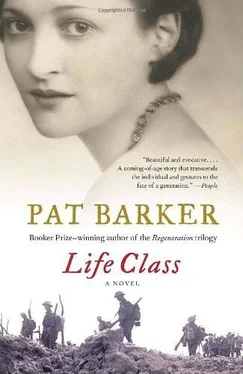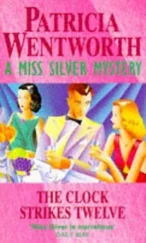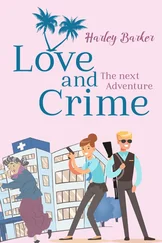Five minutes later the first call came. They ran towards the camouflaged shed where the ambulances were parked. Paul cranked the handle, survived its first vicious kick and climbed into the cabin. Soon he was bumping gently across the uneven ground. Peering through the muddy windscreen at the road ahead, he thought, for a second, of Elinor, before the reality of his surroundings grabbed him. Snow-stippled fields. Here and there, a blurred moon stared up from frozen puddles at the side of the road. He kept the ambulance in low gear, labouring up the hill. As he got closer to the front, it needed all his attention to steer round pits and craters in the road. The road was crowded now with motor lorries, columns of marching men, horse-drawn limbers taking the rations up. At the crossroads, which had been subjected to repeated heavy bombardment, a shattered crucifix stood in the middle of desolation, the figure of Christ reduced to one hand hanging from a nail. He hated that hand: it offended him that such a banal image should have so much power.
But he hardly existed now as a person who could hate anything. He was a column of blood, bone and nerves encased in a sheath of cold, sweaty skin. His hands kept slipping on the wheel. When at last he dropped down from the cab and began to walk towards the clearing station his legs again threatened to give way under him.
The CCS was in the cellar of a ruined farmhouse. You went down a flight of narrow steps — so narrow you had to plant your feet sideways — into a whitewashed room lit by oil lamps. At the far end a surgeon worked in a makeshift theatre, patching men up for the journey back. On benches ranged along the wall the walking wounded waited. They’d had iodine sloshed into their wounds and been bandaged, but all were in shock, blue some of them, jaws wobbling, hands shaking. Paul shared out his cigarettes.
‘What about me?’ the surgeon called plaintively from behind his mask. ‘Don’t I get one?’
He was bent low over the table, now and then pausing to drop handfuls of flesh into a bucket by his feet. Paul went across, pulled the surgeon’s mask down and stuck a lighted cigarette between his lips. The tip glowed red as he inhaled. ‘Thanks. I’ve been dying for that.’
As he spoke, he straightened up and groaned — he must have been hunched over that table for hours.
Paul risked a glance at the patient, an abdominal. He thought of all the shell-holes between here and the base hospital and felt like groaning himself.
He took one stretcher case, the rest walking wounded. Now they were on the move, going away from the front, the lightly wounded became positively cheerful, laughing, joking, clenching their teeth against the pain only to burst into laughter again a minute later. A canteen was passed from mouth to mouth and it certainly didn’t contain water. But then the stretcher case recovered consciousness and from then on every jolt of the wheels on the shelled road produced a scream. He was begging for water. Paul shouted at the others not to give him any and they grumbled assent, obviously offended at being taken for idiots. Paul crouched forward in his seat, hunched over the wheel, peering through the windscreen at what little the fitful moon revealed of the road ahead. He felt useless. Nothing he could do in the way of nursing care was more likely to save the man’s life than just getting him back to base as fast as possible. But in places the road was almost impassable. The bombardment had been heavy and accurate. At one place he came upon a tangle of broken wagon wheels and dead horses where a limber had been hit. He pulled to the side and slowed to a crawl. He’d just drawn level when one of the apparently dead horses reared its head and screamed. Frightened though he was, he’d have got down and put the poor beast out of its misery, but ambulance drivers didn’t carry revolvers. Screwing up his face, he drove on.
Once past the horse he began to relax — he was almost at the end of the worst stretch of road — but then, no more than ten, twenty yards further on, he saw a dark shape ahead. As he slowed down, it was joined by a second, and then a third. Men, some of them badly wounded, crawling out of the ditches that lined the road. He stopped and wound down his window. He couldn’t understand the words but it was obvious what they wanted. They had no faces, only flaking mud masks with white circles round the eyes and red wet mouths struggling to speak. When words failed, they pointed to their wounds.
He raised two fingers. ‘Deux.’
That was more than he ought to take, but he couldn’t just drive past. Jumping down from the cab, he walked round to the back of the ambulance, feeling them behind him jostling and treading on his heels. These were the drivers of the horses he’d just passed.
‘Deux,’ he said again, but they all pressed forward, clutching at him, showing their wounds. He opened the door, jumped inside and said, pointing at random, ‘You and you.’ Another scrambled in before he could get the doors shut. Then he struggled through the others, the ones he couldn’t take, back to the driver’s cabin. He’d call the relay station as soon as he got to the hospital. An ambulance would go out to pick up the rest.
But they couldn’t know that and one or two of them mightn’t last. As he drove off, the wheels churning in slush, he hardly dared look into the rearview mirror, where, framed in that small space, a group of mud men dwindled into the distance, staring after the ambulance, which took away with it, as they must believe, their best chance of life.
Paul to Elinor
After all the excitements of last week we seem to be in another quiet patch. I managed to get back to the town for two nights and spent them painting and lying in the bed in our little room thinking of you. I try to convince myself there’s a ghost of your scent on the pillows though I know it isn’t true. You seem ghost-like to me now. I’ve lost the sense of your voice, the way you move. I always see you sitting still somewhere, more especially in the window at the Slade. Do you remember how you used to sit there waiting for Tonks to come out and sign your exhibition entry forms? I walked past you once but you were too deep in your thoughts to look up and notice me. I see you like that now, framed by the arch of the window, very tiny and far away.
Because it’s so quiet we’ve been given another job: transporting the dead (which The Hague Convention does allow; it doesn’t allow the transport of military personnel who are alive and all in one piece, even if they’ve collapsed with exhaustion). We didn’t mind too much because we thought we’d be dealing with the recent dead, but it seems this particular Casualty Clearing Station had a backlog of corpses. It wasn’t clear why. Men who die at a CCS are generally buried as close to it as possible. They’re surrounded by these little dark crosses that always look like birds’ footprints to me, though I mentioned that to Lewis and he couldn’t see it at all.
Anyway there they were piled up in a corner of a yard under a black tarpaulin cover weighted down with bricks. We put on surgical masks and gloves and just got on with it, though it was depressing, to say the least. You go into a trance, it’s the only way, then suddenly I looked down and realized that one of the men at the bottom of the heap was wearing British army uniform. The others were all French. He must have got separated from his unit or perhaps this ground was fought over by the British in the first few weeks of the war. He’d been there a long time. In fact he was so badly decomposed that when we tried to lift him he came apart in our hands.
Somebody loved him once. And still does, that’s the devil of it.
What a gloomy letter! I always feel I have no right to burden you like this, but these things happen and if I didn’t write about them I don’t know what else I’d find to say. On a more cheerful note (and high time, too, you may think!) we’ve finished that job now and we can start putting it behind us. This morning we treated ourselves to a bath and a shave in town and came out into the raw air afterwards pink as shrimps with tight, raw, shiny faces. Now it’s afternoon and we’re going to kick a football round the field behind the school for an hour or so and then have supper.
Читать дальше












